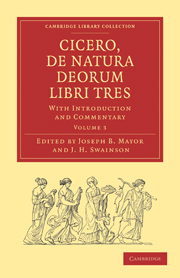Commentary
Published online by Cambridge University Press: 05 October 2010
Summary
Introduction. Cotta regards the Stoic doctrine as deserving of more serious attention than the Epicurean. For himself he is content to believe as his fathers did; if the Stoics profess to base their religion on grounds of reason, they must be prepared for criticism. I 1—II 6.
Ch. i § 1. neque tarn refellendi: ‘though not so much with the view of refuting you, as to ask for explanation’. For the adversative use of neque cf. above II 95 nee tamen exissent; I 107 nee ea forma; Off. in 7 deinceps se scripsit dicturum, nee exsolvit quod promiserat; Sail. Cat. 24 § 3 aetas tantwn modo quaestui neque luxuriae inodum fecerat; Nep. Them. 10 § 4 ait morbo mortuum, neque negat fuisse famam venenum sua sponte sumpsisse; Caes. B. O. vn 62 § 8 (hostes) collem ceperunt, neque nostrorum militum impetum sustinere potuerunt (which is contrary to Hand's rule that only the form nee is used by Caesar in this sense); Mayor on Plin. Ep. ill 1 § 9; Hand Turs. iv p. 104, Draeg. § 318. 7.
suo cuique judicio: the boast of the Academics, cf. I 10.
id sentire, quod tu velis: ‘to take the view which you would like me to take', see Roby § 1536.
- Type
- Chapter
- Information
- Cicero, De Natura Deorum Libri TresWith Introduction and Commentary, pp. 59 - 199Publisher: Cambridge University PressPrint publication year: 2010First published in: 1885

